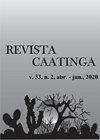Gas exchange and post-harvest quality of ‘Kent’ mango subjected to controlled water deficit in semi-arid region
IF 0.9
4区 农林科学
Q3 AGRONOMY
引用次数: 0
Abstract
ABSTRACT Brazil is the seventh largest producer of mangoes in the world, and the São Francisco Valley is the main producing region, with ‘Kent’ as one of the main cultivars. Considering that irrigation management affects physiological events, production and fruit quality, the objective of this work was to evaluate the gas exchange in the leaves and fruit quality of ‘Kent’ mango subjected to controlled water deficit in the semi-arid region. The experiment was carried out in Petrolina-PE, semi-arid region of the São Francisco Valley. The experimental design used was randomized blocks, in a triple factorial scheme, with four irrigation depths (40, 60, 80 and 100% of crop evapotranspiration - ETc), three phenological stages (F1 - flowering, F2 - fruit growth, F3 - fruit maturation) and two production cycles (2018 and 2019), with four replicates. During the phenological stages, the physiological parameters of gas exchange were evaluated. After harvesting, the following parameters were evaluated: soluble solids content, titratable acidity, pH, firmness and peel color. Irrigation with a depth between 79.5 and 83.6% ETc during the evaluated stages promoted greater gas exchange in the leaves, greater firmness and acidity in the fruits. The reduction in irrigation depth in F1 and F3 reduced the soluble solids content, while in F2 the highest soluble solids content was obtained with irrigation between 68.24 and 74.5% ETc. The most suitable irrigation depth for ‘Kent’ mango cultivation depends on the purpose of the producer and on the phenological stage of the crop.半干旱区可控缺水条件下“肯特”芒果的气体交换和采后品质
巴西是世界第七大芒果生产国,而弗朗西斯科山谷是其主要产区,“肯特”是其主要品种之一。考虑到灌溉管理影响生理事件、生产和果实品质,本研究的目的是评估半干旱区“肯特”芒果在控制水分亏缺条件下叶片中的气体交换和果实品质。试验在旧金山谷半干旱区Petrolina-PE进行。试验采用三因子随机分组设计,设置4个灌溉深度(作物蒸散量的40%、60%、80%和100%)、3个物候阶段(F1 -开花、F2 -果实生长、F3 -果实成熟)和2个生产周期(2018年和2019年),共4个重复。在物候阶段,对气体交换的生理参数进行了评价。收获后,评估以下参数:可溶性固形物含量,可滴定酸度,pH值,硬度和果皮颜色。在评价阶段,灌水深度在79.5 ~ 83.6% ETc之间,促进了叶片的气体交换,果实的硬度和酸度增加。F1和F3灌水深度的降低降低了可溶性固形物含量,F2灌水深度为68.24% ~ 74.5%等时可溶性固形物含量最高。最适合“肯特”芒果种植的灌溉深度取决于生产者的目的和作物的物候阶段。
本文章由计算机程序翻译,如有差异,请以英文原文为准。
求助全文
约1分钟内获得全文
求助全文
来源期刊

Revista Caatinga
AGRONOMY-
CiteScore
2.10
自引率
11.10%
发文量
67
审稿时长
6-12 weeks
期刊介绍:
A Revista Caatinga é uma publicação científica que apresenta periodicidade trimestral, publicada pela Pró-Reitoria de Pesquisa e Pós-Graduação da Universidade Federal Rural do Semi-Árido – UFERSA, desde 1976.
Objetiva proporcionar à comunidade científica, publicações de alto nível nas áreas de Ciências Agrárias e Recursos Naturais, disponibilizando, integral e gratuitamente, resultados relevantes das pesquisas publicadas.
 求助内容:
求助内容: 应助结果提醒方式:
应助结果提醒方式:


